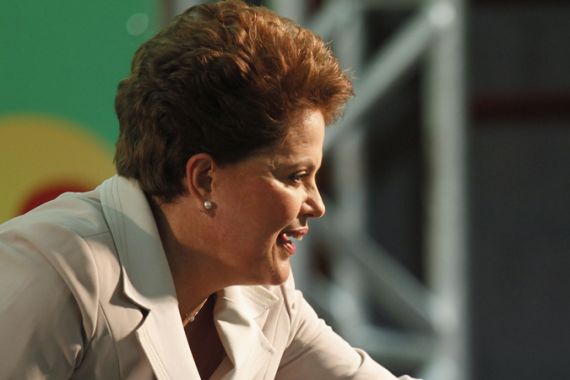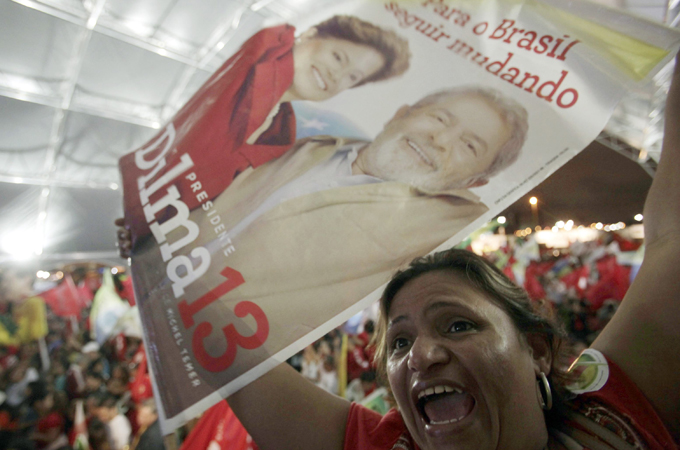Who is Dilma Rousseff?
Al Jazeera looks at the challenges Brazil’s president-elect is facing as she steps out of the shadow of her predecessor.

 |
| Rousseff’s victory in Brazil’s presidential election has been celebrated across the country [Reuters] |
The world on Monday wakes up to the news that Dilma Rousseff will be Brazil’s next head of state – and the country’s first woman president – after she defeated Jose Serra 55 per cent to 44 per cent in the runoff.
The question many around the world might be asking themselves now is: Who is Dilma Rousseff?
Up until only a few years ago, many Brazilians were asking themselves the same question.
The short answer is this: She is the daughter of Bulgarian immigrants to Brazil. In her teens she was jailed and tortured during the military dictatorship for her participation in a Marxist group. Some like to say she is an “ex-guerrilla,” like she was in fatigues planting car bombs or something, which is not quite the reality.
She is a trained economist, and highly regarded administrator, who was unknown in Brazil when Luiz Inacio Lula da Silva, the president, picked her to be his minister of mines and energy in 2003. She is twice divorced and currently not married.
She is a recent cancer survivor. And she is someone who – when the first presidential poll came out in late 2008 – was polling at a paltry nine per cent.
And did I mention, up until now, she has never held any elected office in her life?
This, in short, will soon be the leader of South America’s largest country.
Following Lula
During the campaign Rousseff’s basic message, which she rarely strayed from, was this: “If you like Lula, vote for me, because I will do exactly what he did the past eight years.” (Lula has 83 per cent approval ratings). Lula, in turn, campaigned almost on a daily basis with Rousseff and implored his supporters to vote for her.
It worked.
At a Sunday night campaign rally for Rousseff’s Workers party, one man told me, “I am very happy, because Dilma won the election and she will give continuity to the work done by Lula”.
Several women told me how proud they were Brazil would now have a woman president.
But because Rousseff was riding the well-earned popularity of Lula, that enabled her the luxury to avoid taking hard stands on many complex, nuanced issues. When boxed in a corner on an issue, especially related to international affairs, she often would parrot the government line, like any good chief of staff would do.
But that is now over. She is no longer Lula’s shadow. She is the one who will be casting the shadow.
Will she push a two-state solution in the Israel-Palestinian conflict? Will she continue Brazil’s engagement with Iran and Turkey, vis-à-vis the Iranian nuclear issue – even if it inconveniences (or downright infuriates) Washington?
Will she go to the World Economic Forum meetings and relentlessly rip the Washington Consensus model of doing business, as Lula often did? As president, would she allow Manuel Zelaya – the democratically elected yet ousted leader of Honduras – to take refuge in the Brazilian embassy, as Lula’s government did?
As president, for Rousseff, these are the sort of issues she will face and how she will act is really anybody’s guess.
One thing is for sure; she is not a woman that will be bullied. She not only succeeded but actually thrived in the mans-only world that is Brazilian national politics.
She is not afraid to pick up the phone and berate a minister for being unprepared in a meeting. And she will certainly not be intimidated in a room full of men in suit and ties. As much of the rest of the world will soon find out, the men will probably be more scared of her than she of them.
But she is not going to win any charisma competitions either.
However, most Brazilians – or at least 55 per cent – seemed to agree by their vote that they are convinced she at minimum won’t screw-up any of the positives of the Lula government.
In the early hours of Monday morning, as Rousseff supporters at the rally danced on top of campaign posters now crumpled and dirty on the muddy grass after a long night of celebrations, it was hard not to think how far Rousseff has come.
From a loyal chief of staff, to a candidate saying she will carry on her popular bosses policies. And now, come January 1 when she is inaugurated Brazil’s first female president.
Despite all the talk for so many months of carrying on Lula’s legacy, in reality, it will be her moment to once and for all begin to write the first page of the first chapter of her ultimate presidential legacy.